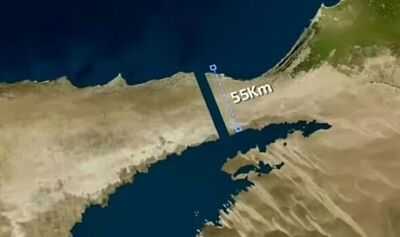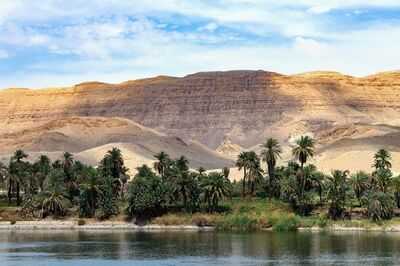
Egypt has unveiled ambitious plans for a £1.5bn 'mini Suez Canal' aimed at transforming its desert landscape into habitable land. With less than 4% of its land deemed habitable, accommodating 116.5 million people within such a limited space has proven daunting for the North African nation.
Egypt is extremely overpopulated, which strains key resources like water and infrastructure, and is the most populous Arab nation and Africa's third most populous country behind Nigeria and Ethiopia. A whopping 97% of Egypt's population lives on 4% of the country's land, largely along the River Nile and baby is born roughly every 17.9 seconds. More than 90% of Egypt consists of desert areas, the two biggest being the Western Desert, a part of the Sahara Desert, and the Eastern Desert.

Its rapidly increasing population, along with its arid climate, is putting an increasing strain on a growing water crisis.
In a bid to solve this formidable challenge, Egypt is proposing converting the desert region in the Qattara Depression into a liveable environment.
The centrepiece of this groundbreaking initiative is the construction of a 34-mile canal costing £1.5 billion.
Dubbed by many as Egypt's 'mini Suez Canal', the construction will channel water from the Mediterranean Sea into the heart of the desert.
This engineering wonder will result in the flooding of the Qattara Depression, creating a sprawling 20,000-square-kilometre lake.
The previously barren lands could potentially transform into fertile grounds, paving the way for agricultural advancements and the creation of new settlements along the waterfront.
The continuous flow of water also presents a significant opportunity for hydroelectric power generation, which is expected to be a key economic driver for the project.
The implications of this transformation are predicted to be profound. The substantial evaporation of water from the newly formed lake is expected to significantly increase humidity levels and rainfall in the surrounding areas.
Egypt's ambitious plan aims to utilise the power of water to not only address its population challenges but also establish a self-sustaining ecosystem that propels growth and development.
You may also like

'Recognise Palestine': Protesters interrupt Trump's address in Israel parliament - Watch

This Bollywood actress has highest number of Filmfare awards

All UK drivers 'who ignore letter' could face £2,500 fine and 3 points on licence

Lalu Yadav, Tejashwi Yadav in trouble again? Court frames charges in explosive IRCTC hotel scam; Here's what the case is all about

Les Misérables arena tour details, tickets, and when it's arriving at Royal Albert Hall







